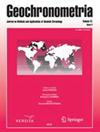Luminescence chronology of fluvial and marine records from subsurface core in Kaveri delta, Tamil Nadu: Implications to sea level fluctuations
IF 0.9
4区 地球科学
Q3 Earth and Planetary Sciences
引用次数: 3
Abstract
Abstract South-Eastern coastal plains of India experience some of the major delta formations of the Indian subcontinent majorly affected by fluctuations of the Indian summer monsoon (ISM) and sea level. Past shoreline signatures in the form of palaeo beach ridges in Kaveri delta (Tamil Nadu, India), suggest a wave-dominated delta and thus past sea-level variations affecting directly the sedimentary dynamics of the Kaveri river forcing the river to either aggrade or prograde. Chronostratigraphic and foraminiferal study of the 25 m deep sediment core taken 2.5 km onshore from Tamil Nadu coast, Kaveri delta shows evidence of changing coastline over the last 150 ka. Various units in the core reflect eight major phases of increased sea level (~3.4 ka, ~5.0 ka, 9–6 ka, 60–57 ka, 89–81 ka, ~102 ka,~121 ka and 143–140 ka) partly coinciding with the global climate cycles MIS 1, MIS 3, MIS 5, MIS 6 respectively during the late Quaternary period. During ~121 ka and 9–6 ka, direct signature of marine transgression is observed by the presence of foraminifera in the core location. The study also shows that the sea transgression during ~121 ka was much longer-lasting and higher than during 9–6 ka, even though not revealed in the Quaternary sea level curve given by previous authors. Depositional breaks are observed in the core during periods of lower sea levels as the river responded by incision. Total organic matter of the deposition between 9–6 ka was observed as high as 2.5–6% suggesting oxygen stressed conditions during the period.泰米尔纳德邦Kaveri三角洲地下岩心的河流和海洋记录的发光年代学:对海平面波动的影响
摘要印度东南沿海平原经历了印度次大陆的一些主要三角洲形成,主要受印度夏季风(ISM)和海平面波动的影响。Kaveri三角洲(印度泰米尔纳德邦)古海滩山脊形式的过去海岸线特征表明,该三角洲是波浪主导的三角洲,因此过去的海平面变化直接影响Kaveri河的沉积动力学,迫使河流加积或前进。Kaveri三角洲泰米尔纳德邦海岸2.5公里处25米深沉积物岩芯的年代地层和有孔虫研究表明,在过去150 ka中,海岸线发生了变化。岩芯中的各个单元反映了海平面上升的八个主要阶段(~3.4 ka、~5.0 ka、9-6 ka、60-57 ka、89-81 ka、~102 ka、~121 ka和143-140 ka),分别与第四纪晚期的全球气候周期MIS 1、MIS 3、MIS 5和MIS 6部分重合。在~ 121 ka和9–6 ka期间,通过核心位置有孔虫的存在,可以观察到海侵的直接特征。该研究还表明,尽管之前的作者给出的第四纪海平面曲线中没有显示,但~121 ka期间的海侵持续时间比9-6 ka期间长得多,而且更高。在海平面较低的时期,由于河流通过切口做出反应,在岩芯中观察到沉积断裂。观察到沉积的总有机质在9–6 ka之间高达2.5–6%,这表明在此期间存在氧气胁迫条件。
本文章由计算机程序翻译,如有差异,请以英文原文为准。
求助全文
约1分钟内获得全文
求助全文
来源期刊

Geochronometria
地学-地球科学综合
CiteScore
2.20
自引率
0.00%
发文量
1
审稿时长
>12 weeks
期刊介绍:
Geochronometria is aimed at integrating scientists developing different methods of absolute chronology and using them in different fields of earth and other natural sciences and archaeology. The methods in use are e.g. radiocarbon, stable isotopes, isotopes of natural decay series, optically stimulated luminescence, thermoluminescence, EPR/ESR, dendrochronology, varve chronology. The journal publishes papers that are devoted to developing the dating methods as well as studies concentrating on their applications in geology, palaeoclimatology, palaeobiology, palaeohydrology, geocgraphy and archaeology etc.
 求助内容:
求助内容: 应助结果提醒方式:
应助结果提醒方式:


